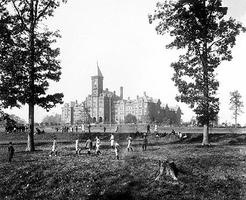
Upper Canada College
Upper Canada College, TORONTO, was founded in 1829 by the Lieutenant Governor of Upper Canada, Sir John COLBORNE, with the intention of it being a non-denominational feeder school for the newly founded King's College (which later became the University of Toronto).
UCC was modelled after Britain's top all-boys schools, most notably Eton College, and employed a principal and eight teachers to educate 57 students in its first year. The original permanent campus was located downtown in Russell Square before it moved to its current 17-hectare site in what was then a rural area known as Deer Park in 1891. The Ontario government stopped funding the college in 1900, making it a completely independent school and the oldest of its kind in Ontario.
UCC purchased 180 hectares of land about 50 km northwest of Toronto near the small town of Norval in 1913, with the intent of moving the campus there. That plan was abandoned but the site has since become UCC's Norval Outdoor School, which provides environmental education and features accommodation for about 25 students plus staff, dining and lounge areas, a classroom and storage facility.
UCC thrived through the first half of the century until 1958, when it was discovered that its main building was in disrepair and would have to be demolished. A major fundraising campaign allowed it to be rebuilt and the school has continued to renovate facilities and add new buildings. It was around this time when UCC started moving away from a classical education to one that was more LIBERAL ARTS-focused, and the school has steadily widened the range of grades offered to students.
The Preparatory School at the south end of the campus has more than 400 students in senior kindergarten through grade seven. Approximately 700 students attend the Upper School in grades eight through 12, and there are facilities to house nearly 90 of them as boarders. UCC has welcomed students from across Canada and 25 countries to its boarding houses. More than 150 students are admitted in various grades each year and are taught by approximately 100 teachers and served by about 160 other staff members.
UCC adopted the International Baccalaureate (IB) Diploma program, which is undertaken by all students in their final two years at the school, in 1995. The IB places an emphasis on critical thinking and the development of higher-level writing and research skills. It cultivates internationalism and respect for other cultures, while the Creativity, Action, Service component helps students develop valuable skills in a variety of areas. UCC also offers the Ontario Secondary School Diploma.
UCC is one of North America's most prestigious all-boys schools and its tuition fees are in line with its vaunted reputation. But while it may have catered to the economic elite in the past, it has committed to attracting a diverse range of top students by making financial aid of up to 100% of tuition costs available to worthy candidates in grade five and above. The goal is to offer full or partial scholarships to 20% of the student population.
UCC launched its Green School initiative in 2002. It emphasizes environmental education and sustainable development through its curriculum as well as through recycling, changing consumption patterns, the creation of a "learning garden" and upgrading the school's physical plant. The William P. Wilder '40 Arena & Sports Complex opened in 2009 with two ice pads (including one of only four Olympic-sized surfaces in Ontario) and received a gold award from Leadership in Energy and Environmental Design.
UCC has a number of other athletic facilities and playing fields as well as classrooms, laboratories and performance spaces that provide enriched environments for academic, artistic and social activities.
UCC has produced 24 Rhodes Scholars and its students have gone on to prominence in a variety of fields. These include: Academy Award-nominated actors Melvyn Douglas and Raymond Hart MASSEY; Emmy Award-winning writer and producer Leonard Dick; multimedia artist Michael SNOW; Olympic medalists James ELDER, Michael Evans, George Mara and Barney Williams; Grammy Award-winning composer Galt MACDERMOT; writers Robertson DAVIES and Stephen LEACOCK; business tycoons Ted ROGERS, David THOMSON and Galen Weston; and premiers Robert BEAVEN, Edward BLAKE and George DREW.

 Share on Facebook
Share on Facebook Share on X
Share on X Share by Email
Share by Email Share on Google Classroom
Share on Google Classroom
